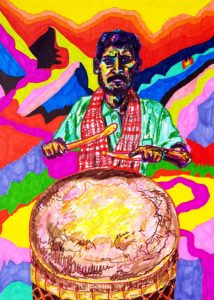Between the Lines, is podcast series produced by the Institute of Development Studies (IDS) which explores books with ideas for positive social and environmental change. In this episode, Michael Woolcock, Lead Social Scientist in the World Bank’s Development Research Group and member of the CREID International Steering Group, interviews Professor Mariz Tadros, CREID Director and a Research Fellow at IDS about the book, What About Us? Global Perspectives on Redressing Religious Inequalities, for which Professor Tadros is the editor. Published by IDS and produced by CREID, the book explores how we can make religious equality a reality for those on the margins of society and politics.
Both the book and podcast are about the individual and collective struggles of the religiously marginalised to be recognised and their inequalities, religious or otherwise, redressed. It is also about the efforts of civil society, governments, multilateral actors, and scholars to promote freedom of religion or belief (FoRB) whatever shape they take.
This podcast is essential listening for all studying and researching religious inequalities.
About the editor
Professor Mariz Tadros is a professor of politics and development and an IDS Research Fellow specialising in the politics and human development of the Middle East. Areas of specialisation include democratisation, Islamist politics, gender, sectarianism, human security and religion and development.
Mariz convenes CREID and is also the PI of the British Academy initiative on heritage repertoires for sustainable development in Egypt and beyond.
About the Interviewer
Michael Woolcock is Lead Social Scientist in the World Bank’s Development Research Group, where he was worked since 1998. For sixteen of these years he has also been an Adjunct Lecturer in Public Policy at Harvard University’s Kennedy School of Government. His research focuses on strategies for enhancing state capability for implementation, on crafting more effective interaction between informal and formal justice systems, and on using mixed methods to better understand the effectiveness of “complex” development interventions.
About the book
‘What About Us?’: Global Perspectives on Redressing Religious Inequalities is about the individual and collective struggles of the religiously marginalised to be recognised and their inequalities, religious or otherwise, redressed. It is also about the efforts of civil society, governments, multilateral actors, and scholars to promote freedom of religion or belief (FoRB) whatever shape they take.
The actors and contexts in the book are as diverse as health workers in Israel, local education authorities in Nigeria, indigenous movements in India, Uganda, or South Africa, and multilateral actors such as the Islamic Development Bank in Sudan and the World Bank in Pakistan. Some of the case studies engage with development discourses and narratives or are undertaken by development actors, while other cases operate completely outside the international development paradigm. These case studies present some important insights, which while highly relevant for their contexts also draw out important insights for academics, practitioners, activists, and others who have an interest in redressing religious inequalities for socioeconomically marginalised populations.

